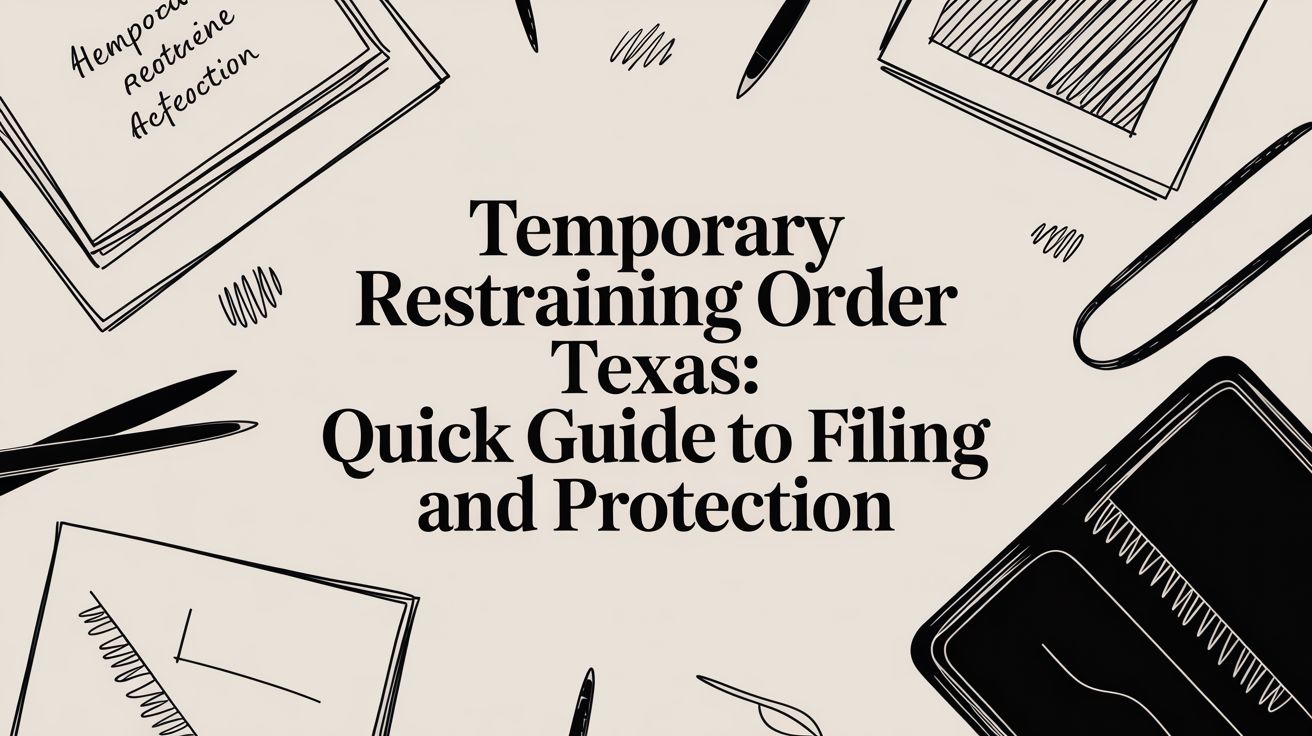
Fort Worth Child Custody Lawyer Tips for Building a Strong Case can make all the difference when the outcome truly matters. Custody disputes are stressful. Emotions run high. Each decision you make can impact your child’s life and your relationship with them. Preparation gives you an advantage. So does having the right legal mindset. You don’t have to go through it blindly.
Understanding how to prepare can reduce stress and build your confidence. The following Fort Worth Child Custody Lawyer Tips for Building a Strong Case will help you present yourself as a thoughtful, capable, and child-focused parent. Let’s explore what steps make the biggest impact.
Understand What the Court Looks For
The Best Interest of the Child Comes First
When it comes to custody cases in Texas, the court’s priority is always the same—the child’s well-being. Judges focus on creating arrangements that foster stability, safety, and positive development. They’re not there to assign blame or settle emotional scores. Instead, they evaluate how each parent contributes to the child’s everyday life and emotional health. They look closely at which parent maintains a safe, loving environment and offers consistent care, structure, and nurturing.
A judge will weigh several factors to make this determination. These often include each parent’s ability to provide a routine, maintain appropriate discipline, ensure academic success, and encourage the child’s relationship with the other parent. The court will also consider the history of caregiving. Who gets the child ready for school or who attends doctor visits? Who participates in extracurriculars? These questions help paint a picture of your parenting role.
Your ability to communicate respectfully
As well as your ability to co-parent effectively will also play a key role. Judges often favor parents who can cooperate and minimize conflict for the child’s sake. Presenting yourself as flexible, respectful, and focused on your child’s long-term needs gives your case strength. If you enter court with a calm, child-centered mindset and demonstrate a clear understanding of your responsibilities, the judge is more likely to view your position favorably.
Rather than focusing on grievances with your co-parent, emphasize what you can offer your child—emotional stability, daily support, and a structured, loving home. That’s the lens the court will use. Show the judge that your approach puts your child first, and you’ll begin building the foundation for a strong custody case.

Start With Strong Documentation
Keep Detailed Records
Fort Worth Child Custody Lawyer Tips for Building a Strong Case always highlight the importance of records. Keep calendars showing your parenting schedule. Save copies of texts or emails related to exchanges and agreements. Document medical visits, school attendance, and important milestones. These records show your involvement.
Write things down. Keep a journal of important dates and events. If something unusual happens, log it. Don’t rely on memory. When your notes are organized and time-stamped, they become powerful evidence.
Track Your Expenses
You may be asked to show how you support your child. Keep receipts for school supplies, clothing, medical care, and activities. Having this information ready proves you take responsibility for your child’s financial well-being.
Be the Parent Who Shows Up
Reliability Builds Credibility
Actions speak louder than words. Judges notice patterns. If you regularly attend school events, keep appointments, and maintain your schedule, the court will take that seriously. Small things—like helping with homework or attending a school meeting—carry big weight in custody decisions.
Don’t miss exchanges. Be on time. Communicate respectfully and clearly with the other parent. Being reliable supports your credibility in court.
Respect Temporary Orders
Even if you disagree with a current court order, follow it. Fort Worth Child Custody Lawyer Tips for Building a Strong Case emphasize following the rules. Judges respect parents who respect the process. If the situation feels unfair, address it through legal channels—not through personal defiance.
Control the Narrative Through Communication
Speak Thoughtfully and Respectfully
Every message can become part of your case. Keep your tone respectful in every email, text, or message. Avoid sarcasm, threats, or emotional language. Speak with clarity. Write like the judge is reading every message. Because someday, they might be.
Fort Worth Child Custody Lawyer Tips for Building a Strong Case always stress this point—tone matters. Communication is your chance to show maturity, even when the situation is tense.
Document Every Exchange
When you discuss schedules, decisions, or changes with the other parent, save the messages. Confirm details in writing. Avoid phone-only conversations when possible. Text or email creates a record that may be helpful later.

Avoid Costly Mistakes
Keep Children Out of the Conflict
Do not involve your child in legal issues. Don’t ask them to pass messages. Don’t speak negatively about your co-parent in front of them. And never pressure them to take sides. Protecting your child’s emotional well-being supports your legal credibility.
Judges see right through manipulation. If your behavior creates emotional stress for the child, it can work against you. Stay focused on what keeps your child secure.
Stay Off Social Media
This can’t be overstated. Fort Worth Child Custody Lawyer Tips for Building a Strong Case always include social media discipline. Don’t post about your ex. Also don’t share personal frustrations and don’t vent online. Even deleted posts can be recovered.
Present yourself as focused, not reactive. Let your actions speak louder than your status updates.
| Mistake to Avoid | Why It Matters |
| Involving your child in the conflict | It places emotional pressure on the child and can harm your case in the eyes of the court. |
| Speaking negatively about your ex | Judges disfavor parents who create tension or try to alienate the other parent. |
| Using social media to vent | Posts can be used as evidence and may reflect poorly on your maturity and ability to co-parent. |
| Ignoring respectful communication | Harsh or sarcastic language in texts or emails can hurt your credibility and be shown in court. |
Prepare for the Courtroom
Dress and Speak with Respect
The courtroom is a formal space. Wear clean, professional clothes. Stand when addressed. Speak clearly. Never interrupt. Treat everyone with courtesy—from the judge to the clerk.
First impressions matter. Show that you respect the court and the process. This professionalism reflects your maturity and responsibility.
Know What You’re Asking For
Don’t walk in with vague requests. Know what custody schedule you want. Be ready to explain why it benefits your child. Judges appreciate parents who have thought things through and can explain their position with logic and care.
This is your moment to show the court who you are—not just as a parent, but as a person committed to your child’s well-being.
Work With the Right Legal Support
Choose a Lawyer Who Knows Fort Worth Courts
Not all attorneys offer the same insight. Fort Worth Child Custody Lawyer Tips for Building a Strong Case often highlight local knowledge. Your attorney should understand the judges, procedures, and expectations specific to Tarrant County.
Ask how much experience they have with custody cases. Make sure they communicate well. You need a lawyer who listens and gives clear advice. This relationship will guide your entire legal journey.
Collaborate and Stay Involved
Don’t hand everything to your attorney and walk away. Stay active in your case. Ask questions. Review filings. Provide timely documents. The stronger your partnership with your lawyer, the stronger your case will be.
Use Technology and Tools
Keep Digital Records
Apps like TalkingParents or OurFamilyWizard are designed for co-parents. They track messages, schedule changes, and expense sharing. These tools reduce misunderstandings and provide a detailed history if problems arise.
Use cloud storage to save court documents and parenting notes. Having instant access to your records shows preparation and focus.
Build a Parenting Calendar
Create a calendar that shows your proposed custody schedule. Include school breaks, holidays, and activities. Judges like to see clear plans. Visual tools help explain your proposal better than words alone.
Focus on Long-Term Parenting Goals
Be Willing to Compromise
Judges want to see cooperation. If you refuse to compromise on anything, it can reflect poorly on your judgment. Flexibility is not weakness. It shows maturity. Courts look for parents who prioritize peace over power.
That doesn’t mean giving up what matters. It means showing that you’re open to solutions.
Always Keep the Child First
Fort Worth Child Custody Lawyer Tips for Building a Strong Case always circle back to this: your child’s needs come first. If your behavior reflects that truth, your case becomes stronger. If your actions show bitterness or control, your position weakens.
When in doubt, ask yourself—does this help my child? That question should guide every decision.

Final Tips for Strengthening Your Child Custody Case
Fort Worth Child Custody Lawyer Tips for Building a Strong Case are more than a checklist—they’re a foundation for building a custody strategy rooted in clarity, consistency, and compassion. These tips reflect the values that Texas courts look for in parents: responsibility, cooperation, and a child-first mindset. Each detail in your preparation—whether it’s maintaining records, showing up on time, or communicating with respect—tells the court a story. It tells them who you are as a parent when no one is watching. And that story matters.
Family law judges evaluate more than legal paperwork. They observe demeanor, behavior, and intent. The way you respond to challenges speaks volumes about your character and capacity to parent under pressure. If you approach your case with discipline, respect, and genuine care for your child’s well-being, you create a strong and trustworthy image. Even when the legal process feels overwhelming, these tips can help ground you and keep your focus where it belongs.
The right legal support
If you stay organized, follow the rules, and focus on your child’s best interest, you’ll present a strong, credible case. You don’t need to be perfect. You just need to be consistent, thoughtful, and steady. Remember that small actions—like attending a parent-teacher meeting or following court orders to the letter—can carry more weight than dramatic claims. Judges are not looking for perfection. They are looking for stability. They want to see that you understand your child’s emotional and practical needs and that you’re equipped to meet them in a meaningful, long-term way. With the right legal support, clear intentions, and preparation, you can navigate this process with integrity and purpose.
Fort Worth Child Custody Lawyer Tips for Building a Strong Case
Are designed to help you stay on track. They remind you to lead with intention, to act with empathy, and to advocate not just for yourself—but for the life and well-being of your child. Let these principles guide your decisions, and you’ll be in a stronger position to secure a parenting arrangement that truly supports your child’s future.
Other Related Articles:
- What to Expect from the Best Child Custody Lawyer in Texas
- How a Katy Child Custody Lawyer Can Help You Protect Your Parental Rights
- How to Request a Child Lawyer in a Texas Custody Dispute
- When to Hire Family Law Order Modification Lawyers in Texas
- The Impact of Divorce on Children Custody and Parenting Plans
- Texas Laws on Getting Your Child Back After Adoption
- What Happens If You Stop Paying Child Support Too Soon in Texas?
- Can Grandparents Sue for Custody or Visitation in Texas?
- Why Hiring a Local Katy Custody Lawyer Makes a Difference in Your Case
- How Texas Family Courts Handle the 1st 3rd and 5th Weekend Custody
Frequently Asked Questions
Judges in Texas look for stability, the ability to co-parent, emotional support, safety, and consistency in the child’s daily life. The best interest of the child is always the primary focus.
The biggest mistake is putting personal grievances above the child’s needs. Speaking poorly about the other parent or refusing to cooperate often backfires in court.
The best way is to stay organized, be child-focused, follow court orders, and demonstrate a consistent commitment to your child’s well-being and routine.
Do not involve the child in conflict, post about the case on social media, ignore court orders, or act out in frustration. These behaviors can harm your credibility.









